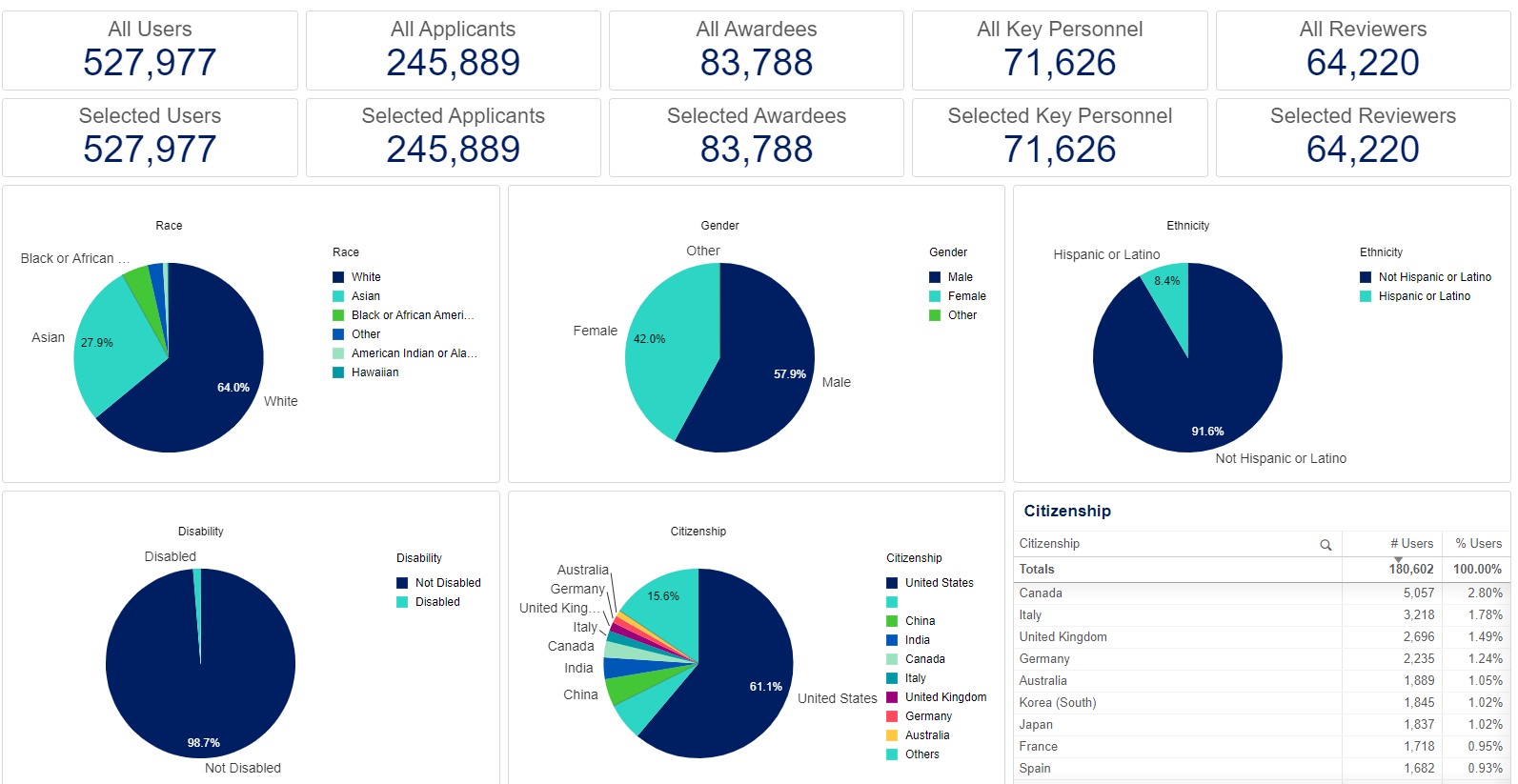At the heart of grant making lies a commitment to diversity, equity and inclusion (DEI). Not only is it essential to ensure equity for grant recipients, but it is also crucial in order to create an equitable peer review process. Without diversity and inclusion in grant making, talented researchers may be overlooked, or the grant selection process may not be as fair and objective as it should be. Let’s begin with some definitions. For the purposes of this checklist, we use the D5 Coalition’s definition of Diversity, Equity, Inclusion:
Diversity is the demographic mix of a specific collection of people, considering elements of human difference, but focusing particularly on:
- Racial and ethnic groups: Asian Americans and Pacific Islanders, Hispanics/Latinos/Latinas, African Americans and blacks, and American Indians and Alaska Natives
- LGBT populations
- People with disabilities
- Women
Improving equity is to promote justice, impartiality and fairness within the procedures, processes, and distribution of resources by institutions or systems. Tackling equity issues requires an understanding of the underlying or root causes of outcome disparities within our society.
Inclusion refers to the degree to which diverse individuals are able to participate fully in the decision-making processes within an organization or group. While a truly “inclusive” group is necessarily diverse, a “diverse” group may or may not be “inclusive.”
With increasing pressure to fund research that benefits society, grant makers must prioritize efforts to promote diversity and inclusion among their awardees. This is important not only to ensure that researchers from all backgrounds are represented, but also to increase the quality of grant proposals by encouraging a variety of perspectives and ideas.
In a 2020 survey of funders conducted by the William and Flora Hewett Foundation, DEI was the number 1 topic of interest among those organizations surveyed. The top five knowledge topics of interest were:
- DEI – 65%
- Evaluation / Assessment – 46%
- Organization Development – 42%
- Grant Making – 37%
- Strategic Planning 35%
And while this survey was conducted in a year rocked by a racial reckoning and the inequalities of a global pandemic, DEI remains a topic that’s at the forefront of many philanthropic organizations. In it’s 2022 trends essay, The Grant Plant listed DEI as topic #1. In the report, the authors noted that funders are increasingly demanding accountability, data, and reporting requirements to demonstrate that DEI is placed appropriately in the work of their grantees. “Funders are looking for indicators that true systemic and systematic changes are being facilitated by the organizations who should be leading change. Even federal applications have begun changing, with presidential directives, including Executive Order #13985 (Advancing Racial Equity and Support for Underserved Communities through the Federal Government) issuing guidance and priorities to focus on equity, access, and inclusivity.”
By prioritizing equity for grant recipients and investing in initiatives that foster diversity and inclusion in grant making, we can help move science forward and create a more just society. Whether through targeted recruitment efforts, enhanced mentorship programs, or increased funding for underrepresented groups, grant makers have a responsibility to ensure that all researchers have the opportunity to succeed.
By promoting diversity and inclusion among grantees, grant makers can truly support the success of innovative and creative ideas that will ultimately benefit society as a whole. Whether it be in the area of arts and culture, science and technology, or social justice and advocacy, grant makers must prioritize diversity and inclusion in order to build a more inclusive society for all. With grant making at the forefront of this effort, we can ensure that grantees are valued for their contributions and supported in their endeavors to create a brighter future for all.
The Grant Plant shared a list of DEI-related questions seen on recent grant applications. This provides a clear window into the importance funders are placing on the topic.
- “How is your organization dismantling systems of oppression?”
- “What experience enables your leadership to represent the population you serve?”
- “How will you identify and engage peers and allies that share your organization’s vision as well as represent the communities you serve?”
- “How do the communities you serve directly inform the focus of what you propose to implement in the coming year? How does your organization respond to and support leadership within these communities?”
- “We understand that organizations are at different stages of the learning journey around equity and racial justice. How would you characterize your current space? What resources/learnings could you share and/or what resources do you need to continue your journey?”
- “Socially transformative work is not a solo endeavor. What role does the work described serve in contributing to more just, inclusive, and equitable communities?”
- “How does the work uniquely challenge conventional approaches to create significant, long-term systemic change?”
In July 2021, the Open Society Foundation published its guide for “Advancing Diversity, Equity and Inclusion in Grant Making.” The guide provides advice for funders on ways to advance diversity, equity, and inclusion in their practices, from designing a grant-making strategy, to building relationships with grantees, and informing funding decisions.
Clearly, grant makers are increasingly recognizing the importance of promoting diversity and inclusion in grant making. By prioritizing funding opportunities that foster equity and inclusion among awardees and grant reviewers alike, grant makers can help to ensure a more equitable peer review process and ultimately make more impactful research decisions. As funders continue to invest in these efforts, we can be confident that our scientific community will only become stronger and more diverse over time.
With dedicated efforts and a commitment to equity and inclusion, we can truly unlock the potential of grant making for the benefit of society as a whole.
Altum is committed to doing our part in the fight for equality in our country and globally. In June 2020, we launched a Diversity Dashboard in Altum Analytics, enabling all grant makers to track the diversity of their applicants and awardees. See a sample below.






